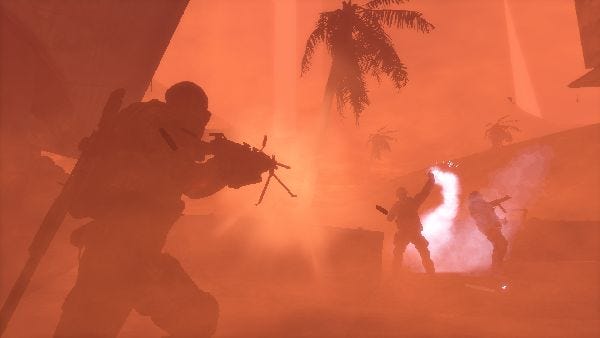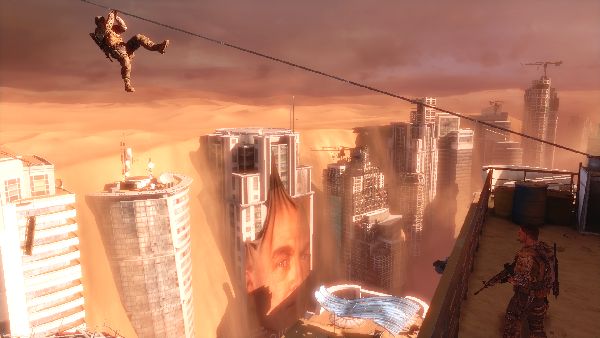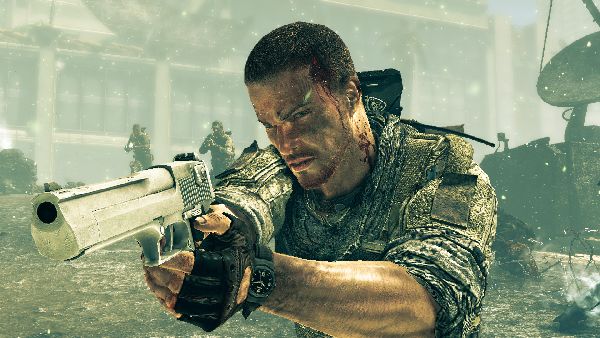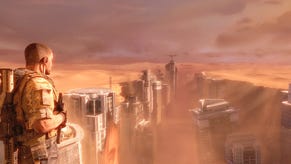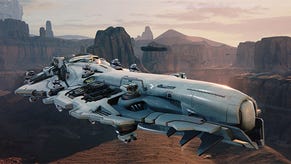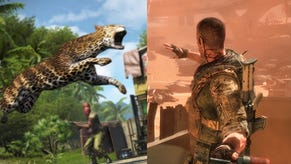Hands On With Spec Ops: The Line
Sandy, sure.
The Spec Ops series has been going since 1998, although came to an abrupt end after eight games and an abandoning of the PC, in 2002. Now, a decade on, it's back with Spec Ops: The Line. We sent Craig to take a look at an early build of the military shooter to see if it's a welcome return.
Sand, like bullets, can kill a man. You need sufficient quantities, but it'll eventually either crush, suffocate, or get in so many sandwiches that the victim grinds his insides away. Given the choice of what I'd rather die of, I'd go with a lead sandwich (bullets) over a sand sandwich (an actual sandwich with sand).
I had two hours with various stages of 2k's new military shooter, Spec Ops: The Line. I clasped an Xbox360 pad in place of a mouse and keyboard and wandered my three-man squad into Dubai. A preternatural amount of sand has been dumped on the city by a massive sandstorm. It cuts the already isolated city off from the rest of the world. The American military sent in a platoon to help with the evac, and they're lost in the isolated metropolis. I'm Commander Walker, head of the recon unit sent in to figure out what's gone wrong, tracing a radio signal that suggests that horrible, horrible things have happened.
For all the careful positioning of the battleground, in one of the few places in the world that could conceivably be completely cut-off, as well as the literary and filmic inspirations that pushes Heart of Darkness and Apocalypse Now ahead of Aliens, Spec Ops is a cover-centric third-person shooter. Finding out what's going on mostly involves ducking and shooting at waves of predetermined enemies. The first of these were in the centre of a dusty highway. Wrecked buses and cars are the cover as the first meeting with the locals goes from shouting at each other to gunny bangs.
They are coercive manshoots, forcing me into cover at the start of pretty much every encounter, as the enemies popped up in overwhelming numbers. From behind a handy small wall I cowered and scoured, taking a few shots over the edge at the surrounding proles. The power of the sandstorm had tossed buildings and vehicles around, and the main force that had me pinned down was standing under a sand-filled bus. Bullets met window and the sand buried them.
It's tuned to be tough and I died a lot, which exposed just how regimented the action is: everything is just so, from the enemy placement to the support waves that come in after being announced by the back-up AI (“The next wave's coming in” sort of thing). I was killed twice by the same RPG guy in one of the bigger fights. To be fair, it was clearly designed to be a stand-out moment: a broken hotel front that fills with enemies on all the levels, to the tune of a 1960s psychedelic track that I'm not allowed to mention. It's impossible to continue, instead I had to snuggle into a wall, and wait for the storm of bullets to finish. The AI team mostly did a good job of moving, covering and killing without any babying from me, although after dying twice from the second floor rocket launcher I set them to target him. We killed until it was time for that particular scene to end: a sandstorm hit and wiped everyone but our team off the face of the earth.
But there were a few other moments that felt just a bit too planned out for my tastes. A rooftop battle had three waves of enemies holding us back, and it wasn't up to us to push forward, but to kill the specified number before it allowed us to proceed.
The linearity and stage management is a symptom of developers Yager wanting to tell a specific story. Shouldering the narrative is Joseph Conrad's Heart of Darkness: as you follow Colonel Konrad's 33rd platoon deeper into Dubai things get darker. You're being dragged into the city, constantly aware of the impact he's had on the place through tannoys and radio chatter and then mass graves and firing squads. Eventually I was given the choice over the murder of two people: on a family man that stole water, or the soldier that punished him by killing his family. It seemed like an easy choice to me, but there are nuances that I actually thought about: did the water the man stole also condemn other people to a painful death? It's up to the player to make the choice to either condemn or to fight for them, and risk both dying.
But it's an impressive spectacle, and there are moments where Dubai covered in sand makes you wish more games explored the world outside New York - a desert floor gave way to a reveal a squad was trudging across a glass ceiling; a whole city block is hidden in a ravine of sand. The demo ends, turning a fight along an abandoned highway into a fight through sandstorm. The sky turns blood red and the wind whips up. Every step is difficult for Walker's team and the enemy, the winds are powerful enough to rip bonnets from cars. At the end, the men hole up in a concrete tube, talking to the taunting Colonel.
Those moments, and the tool tips mixed up with messages about the American army's suicide rate, feel oddly out of place. A message occupying space with traditional, sometimes rarrrr-shoot-things-while-metal-blares gun game. Even when the squad is openly questioning your decisions, bringing the story from cut-scenes in-game, the two sit uneasily together. Maybe I'm expecting too much, or it needs the full game to appreciate how the two mesh, but it feels like a game without a coherant tone. It's ambition, to be about something, currently feels at odds with the repetitive action.
Spec Ops: The Line is due out at some unspecified time in 2012.
